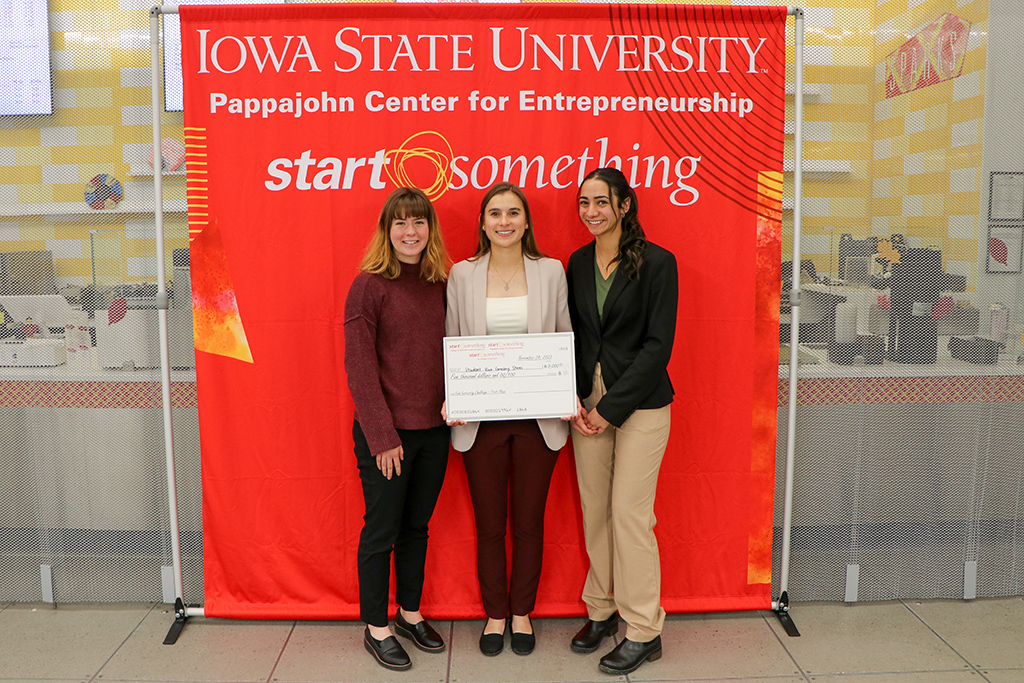News
Global Resource Systems students take on the Food Insecurity Challenge

Pictured left to right, Molly Simmons, senior in environmental science, Daniella Thuerauf, junior in global resource systems, and Morgan Lang, junior in global resource systems, won first-place with their idea of student-run grocery stores. Photo courtesy of the Pappajohn Center for Entrepreneurship
By Madelyn Ostendorf
Students across Iowa State University teamed up to tackle food insecurity in the second annual Food Insecurity Challenge. The competition, hosted by the College of Agriculture and Life Sciences, the Ivy College of Business and the Pappajohn Center for Entrepreneurship, aims to teach undergraduate and graduate students about the multitude of issues those who are food insecure face by challenging them to find reachable solutions.
The competition, co-organized and led by Judi Eyles, director of the Pappajohn Center for Entrepreneurship, and her team, kicked off on Nov. 6 with a Hunger Banquet held in the Student Innovation Center’s Stepatorium, where over 100 students from every college learned about the realities of food insecurity at Iowa State, in Iowa and worldwide. Participants were randomly divided into high-, low- and middle-income groups, which determined what type of meal they received. High-income students received a pasta buffet, middle-income students received beans and rice, and low-income students received only rice.
“Understanding food insecurity as a concept is one thing,” said Carmen Bain, associate dean of academic innovation. “It’s another to be sitting, holding a cup of rice while someone else is sitting next to you at an all-you-can-eat buffet. The hunger banquet really helps to put what we are trying to do into perspective.”
After dinner, participants discussed the impact of the activity and how they felt being in each group. Walter Suza, adjunct associate professor of agronomy and George Washington Carver Endowed Chair, delivered the keynote address. He told the story of Carver and his efforts to end hunger and Suza’s own efforts to do so. Suza also encouraged students to think critically and be creative with their solutions to hunger.
Eyles and her team tasked the students with finding a food insecurity issue in Iowa, identifying its problem and coming up with a solution before the final presentation on Nov. 28. Some example problems the teams could tackle were food deserts, supply shortages, food quality, poverty, education and food waste.
Presenting their innovative ideas
On presentation day, 20 teams were divided into three competition rooms at the Student Innovation Center, where they presented their solutions to a panel of three judges. Each room selected one finalist to compete for the top prize in the final round and one runner-up team to receive a $500 prize.
The cash prizes at stake were $5,000 for first place, $2,500 for second place and $1,500 for third place.
The grand prize went to a team comprised of Morgan Lang, junior in global resource systems, Molly Simmons, senior in environmental science, and Daniella Thuerauf, junior in global resource systems. The team recommended implementing student-run grocery stores in towns where local grocery stores had closed. Theoretically, the store would operate out of an empty room in the school. It would be run by a class of students for credit and managed by a hired part-time employee and the existing Future Farmers of America or Family, Career and Community Leaders of America teacher.
“I was inspired to participate in the Food Insecurity Challenge because of the opportunity to apply my skillset to solve a real-world problem affecting fellow Iowans,” Simmons said. “Participating in the Challenge pushed me to broaden my perspectives on what it means to be food insecure. It was rewarding to learn about the process behind solving a multi-faceted issue and the need for tailoring solutions to community needs.”
Hala Deng, senior in biology, Taylor Moore, graduate student in food science and human nutrition, Anvay Sane, sophomore in food science, Andrew Sohl, sophomore in culinary food science, and Guin Austin, a community member from Ogden, Iowa, were on the second place team. They proposed an addition to the existing MyState app so students could view local food banks and pantries and check what was in stock. They also planned to display CyRide stops that were near the locations.
Sane said the team was inspired by the fact that a third of Iowa State students were food insecure. When they saw how many resources were available that students weren’t aware of, the team wanted to do something to make them more accessible.
Third place went to Alyssa Rodriguez, senior in human development and family studies, Travis Schake, senior in dietetics, and Brenna Hartse, senior in industrial technology. They proposed a database of food banks, volunteer opportunities, political issues, and low-cost, high-nutrition recipes that were locally available. Users could sign up for notifications to be sent to their phones when new information was available or use the database like a regular website.
“Being among the top three finalists in the Food Insecurity Challenge is truly an honor,” Hartse said. “Witnessing diverse teams unite around similar innovative solutions to address this pressing issue was exciting. Our shared vision shows the potential of technology to make a meaningful difference, and I look forward to exploring future opportunities with them.”
Both the second- and third-place teams plan to continue their projects and connect with the SHOP, Iowa State’s on-campus food pantry.
“A complex problem like food insecurity requires collaboration among individuals who can bring their different disciplinary expertise to the problem,” Bain said. “The Food Insecurity Challenge is a way to get students across the university working together to think about new, innovative ways that they can be part of working to solve a complex problem.”
Read the original story posted by the College of Agriculture and Life Sciences, Students take on the Food Insecurity Challenge | College of Agriculture and Life Sciences (iastate.edu).

